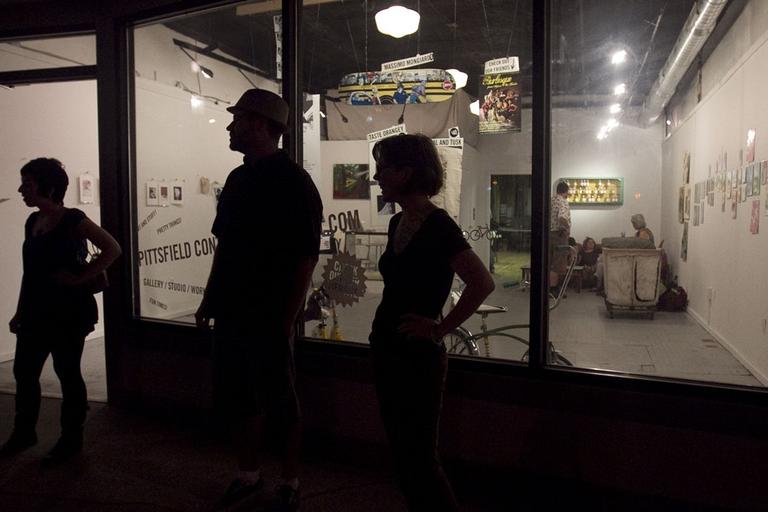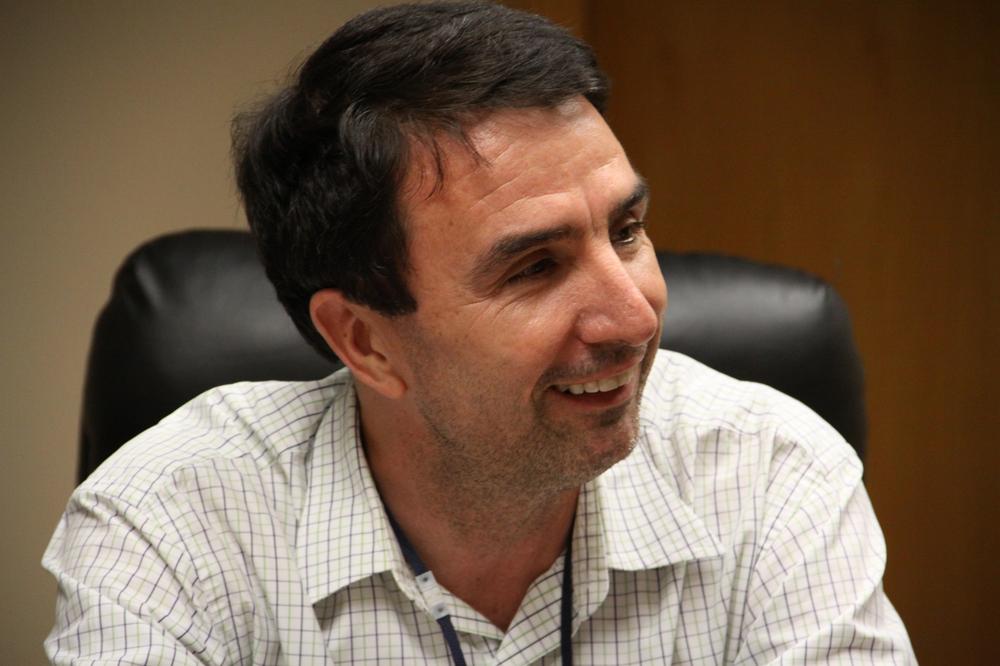Advertisement
Pittsfield, Once A 'Speed Bump,' Now A Destination
PITTSFIELD, Mass. — Here in the lush, rolling hills of Berkshire County, this city is the end of the road for Route 9. And that, too, is how Pittsfield has long been seen.
"It truly was a speed bump, because it offered nothing for anyone to be proud of," said Jim Ruberto, the mayor of Pittsfield. But notice he said was a speed bump. If you haven't here in awhile, you might be surprised by what you'll find.
The most vivid sign of new life in Pittsfield is Third Thursday, a monthly arts festival that draws thousands of people onto the city's main drag, North Street.
It's a scene that would have been unimaginable 10 years ago, when Ruberto — not yet the mayor — returned here after 31 years away to retire in his beloved home town. What he found was more like a ghost of that town.
"I would say Pittsfield's storefronts were pretty vacant. And the spirit of the people was unsettling. There was a lot of anger within this community," Ruberto says.
General Electric, the largest employer in Pittsfield, had left the city by the end of the 1980s. But Ruberto says the company's leaving was not the main cause of frustration for the community.
"I think really the core isn’t so much that General Electric left the city. It was the fact that when General Electric left, there was no true direction as to where the city should go in terms of trying to identify or brand its future," he says.
"When I came up to Pittsfield, I counted half-a-dozen empty storefronts and immediately thought, 'This would be an incredible studio space.'"
Maggie Mailer, painter
That's because until then, GE had been Pittsfield's identity. The company built all its power transformers here, a massive operation. At the height of production, during World War II, GE employed 14,000 people in a city of just about 50,000.
In other words, if your dad didn't work here, your uncle or your brother did.
"No question, it was the company. It was the town, really," says Nicholas Boraski, who was vice president of GE. "The economy here rose and fell on how well GE was doing, which was a direct response of the national economy."
By the time Boraski came to Pittsfield to run the operation, in 1974, demand for transformers had already started to lag.
Over the next few years, the jobs dwindled — down to 10,000, then 7,000, then 6,000. And finally, the company closed its operation altogether, and for the next 20 years, Pittsfield was not much more than the city GE left behind.
Seriously Good Timing
"The city was in such a state that I decided to run for mayor," Ruberto says.
Ruberto's decision, as crazy as it might seem for someone planning to retire, was the first important part of this story. The second part involves some seriously good timing.
"When I was running in 2001, Maggie Mailer was starting her Storefront Artists program," he says.
A painter, Mailer had been living in Brooklyn, but after Sept. 11 she was inspired, like Ruberto, to return to her childhood home in Pittsfield. And where some people saw despair, she saw possibility.
"When I came up to Pittsfield, I counted half-a-dozen empty storefronts and immediately thought, 'This would be an incredible studio space'," Mailer says.
Mailer is the daughter of the novelist Norman Mailer.
"This is all being unused, you know, why not — it just seemed so obvious — I thought, 'How come no one else is thinking of this?' And I started asking the landlords if they would let artists use the spaces for studios, temporary studios," she says.
Advertisement
Pittsfield's Gradual Makeover

The landlords were quick to embrace any idea that might bring some life back to North Street. And so, slowly, Pittsfield's empty storefronts started to fill with artists.
Ruberto, who by this time had been elected mayor, noticed this growing scene in the downtown.
"And what fascinated me was the only element in the community that truly seemed energized was the art community. So when you see electricity in a bottle, you ask yourself, 'How do you make the bottle bigger?' And you feed it. And when I became mayor, that's exactly what I did," Ruberto says.
What had begun as a grassroots movement suddenly gained a powerful ally.
One of Ruberto's first acts was to invest $1 million to help re-open the Colonial Theatre, a majestic old playhouse and vaudeville theater downtown.
"It was the cornerstone of the entire revitalization. Pittsfield needed a win. They needed a win. Its government needed to show that it could help accomplish something positive," he says.
"In anticipation of the Colonial opening, the Barrington Stage made the decision to move to this community, because they felt comfortable that this community was moving in the direction of a community that was going to celebrate arts and culture. And I believe that beginning of a critical mass gave an awful lot of comfort to a hopeful community," Ruberto says.
"You'd have to have been here five years ago even to look at what the downtown looked like versus what it looks like today."
Michael Tweed-Kent, vice president, General Dynamics
Unfamiliar Territory
In the four years since, 10 art galleries have come to Pittsfield. In total, about 12 new businesses have opened up, ranging from a big fancy Asian restaurant to a punk-rock record store.
There's no question there has been growth in the downtown. But it's not the kind of growth Pittsfield is used to.
"Historically, the economy of Pittsfield was based on the idea of designing stuff, building stuff, putting it in boxes and shipping it out of here," says Williams College economics professor Stephen Sheppard.
"And the idea that you could transform and have a major part of your economy built not on doing stuff and shipping it away, but doing stuff here and enticing people to come here and pay to watch it, that's kind of a strange idea. That's going to generate controversy," he says.
It did. Enough controversy that last November, Ruberto almost lost his seat. His challenger, Dan Bianchi, ran a campaign attacking the mayor for an economic strategy centered on the arts in a city where the unemployment rate still nears 10 percent.
"You know, you can't just have a downtown that caters to the arts and hope that, you know, you're going to encourage companies to come here," Bianchi says.
Bianchi came within 209 votes of becoming the new mayor of Pittsfield.
"I think that there’s quite a few people who feel that there has been too much emphasis on the arts and not enough on, for example, bringing in high-tech, small manufacturing, businesses that can support families," he says.
But Ruberto says that luring small businesses is his goal. But first, he says, you have to give them a reason to come.
If the city has a reputation as a speed bump, it's hard enough to get people to slow down on their way through, let alone stop.
"You have to break through a certain perception barrier to start a dynamic process of development, of attracting new firms and new industries to a region," Sheppard says.
"And the development that's taken place in the cultural sector is a first step to that. It sends the message out that Pittsfield is an interesting city, it's an attractive place to live and it's a place where entrepreneurs and people in all sectors of the economy might want to consider coming to or operating in."
A New Workforce
People like Michael Tweed-Kent, vice president and general manager for the mission integration systems division at General Dynamics.

With more than 1,000 workers, General Dynamics is the biggest private employer in Pittsfield. And 700 of those jobs have been added since 2005.
Of course, a defense contractor doesn't add jobs because of an arts scene. But Tweed-Kent says it has been invaluable in helping him attract and keep the kind of talented people he needs.
"You'd have to have been here five years ago even to look at what the downtown looked like versus what it looks like today. And not only for individuals we're recruiting but for the employees, the 1,000-plus people who work here, to have that kind of richness and culture to go along with what we have, with Tanglewood and the other arts that are in the area," Tweed-Kent says.
Nobody pretends that Pittsfield is perfect. But it's not a speed bump anymore, either. It's the kind of place where you might want to spend a Thursday evening. And the kind of place you might come back to, to see what happened while you were gone.
This program aired on September 24, 2010.